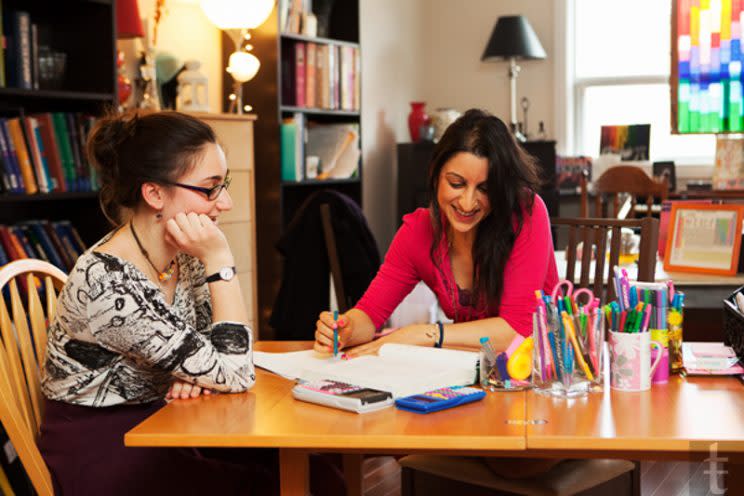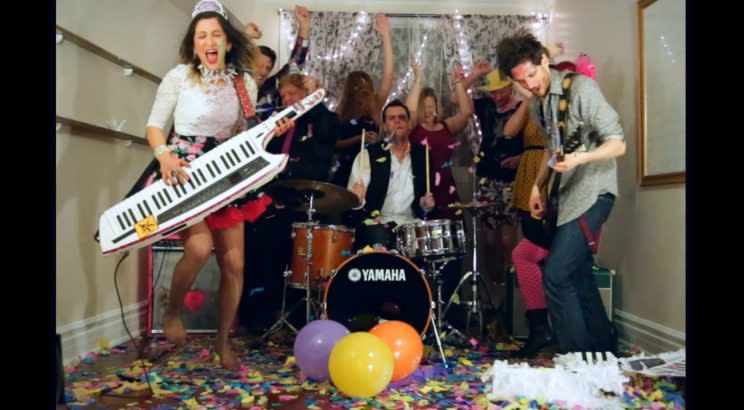Q & A: Vanessa Vakharia, one of 'Canada's Smartest' people, is a math guru who also rock n' rolls

Talking to Vanessa Vakharia is a lot like speaking with a 15-year-old girl, and she wouldn’t dispute that description.
“Look, that’s who I spend my time with, like I use a lot of ‘likes’, ” laughed Vakharia, who runs a popular tutoring service in Toronto called The Math Guru. “People always say that I don’t sound smart, but the words coming out of my mouth are.”
Vakharia speaks in a rushed staccato, running her thoughts into one another, and with an assured sensibility about what she does.
“I know I don’t fit the stereotype. I have a Valley Girl inflection, so I always get ‘Oh, you’re a math teacher?!” she told Yahoo Canada News. “There are different ways to be intelligent.”
That’s what drew Vakharia to the CBC show Canada’s Smartest Person. She is featured on this Sunday’s episode.
“The whole purpose of that series is to show that intelligence is not black and white, or one-dimensional, that’s why I like it.”
Speaking of which, Vakharia — who has run The Math Guru for five years and employs 22 tutors who help about 100 students every week — is also a rocker. She’s the lead singer of Goodnight, Sunrise, which just came back from a U.K. tour and they’ve cut their second record. Vakharia describes the music as “Florence and the Machine meets classic rock.”
In her other life running the tutoring company, she is just as passionate. Yahoo Canada News got some insight into Vakharia’s successful methodology and philosophy. The responses have been edited and condensed for clarity and length.
What were your experiences with math growing up?
When I was in high school, I wanted to be an actress and marry Keanu Reeves. I went to an academic school. It was very stuffy. When it came to math class, I didn’t like the teacher and I didn’t care. I failed Grade 11 math, twice! And I thought: I’m not good at math. And in fact, no one was saying “You’re not reaching your potential.” I thought of myself as an artsy person.
My parents were of another mind. They said, “No, you’re not marrying Keanu Reeves, you’re going to this alternative school.”
Unfortunately, it doesn’t exist any more. It was very small and there was no such thing as a math or arts curriculum. I told my teacher, “I’m not a math person.” She said: Just relax and do the work. I gave it a shot, and I got 99 per cent in math that year. It was crazy. It was a combination of being told that I was telling myself a lie about not being a math person, and also making an effort not to attach a stigma to math.
What makes your tutoring technique different from other places / classrooms?
Number one, when you walk in you see that it doesn’t look like a classroom. It’s like a yoga studio meets your best friend’s apartment. We have a lobby area with couches and a kitchen and pillows and three rooms, which are decorated differently with various colours and tapestries. It’s super relaxed with candles and lattes. You already feel, “Hey, I can identify with this space.” I always thought of what I needed when I was 16 and struggling to learn. I didn’t like those school hallways or desks and always did my homework in cafes with friends.
Secondly, I have tutors that can understand each kid for everything that they are. Everyone has their own way of learning and their own baggage. The tutor has to be able to tailor their lesson to the individual’s needs, whether they learn with diagrams or have to link math to the real world, that kind of stuff.
My tutors are students themselves so they can relate to the kids, and they are also multifaceted. So if a tutor is a triathlete and good in math, the student will think: Oh, I can have other interests and also be interested in math.
The thing that stops people from learning math is emotions. It doesn’t matter how well a lesson is taught if you don’t tackle that issue.
What lead to this particular career?
I worked in marketing because I had a marketing degree, but I was bored and didn’t like it. Then I taught for a while and hated it because I’m not a disciplinarian. I ended up tutoring to earn money for a trip I was going to take. And then I loved it! I loved the one-on-one and being able to shape a student’s life and have that opportunity to keep doing that.
So, I did my Masters in Education and focused on the topic of why girls get high test scores but have no confidence in their abilities. It’s about stereotypes and that’s so damaging to people — even the ones that are deemed “intelligent.”

What is it like to see that you’ve helped someone understand math?
It’s so cliche, but it’s that “a-ha” moment. That’s exactly what it is. You really can hear sounds of laughter and “oooohhhh” from the rooms. It’s the most beautiful thing.
Last week we had a new student, and her mother was saying that her daughter hates tutoring. But then when the student came back she said: I want to thank you because my mind has been completely blown. I never understood math in my life. It just clicked for me that none of this is very hard.
Some of these kids have had very damaging experiences. We see a lot of math anxiety. I had one student who would cry every time there was a math exam. She was good at math. We went into the root of her problem — what does it mean to fail at math? Failure is an obstacle, not an absolute.
I’ve probably helped about 1,000 students now and I keep in touch with many of them. Some are in their early 20s and we have drinks now and talk about life. It’s so rewarding.
And what about being a contestant on Canada’s Smartest Person, what was that like for you?
It’s all been shot and edited so I can’t say too much. I wanted to be on the show so people could understand that a math teacher could go against the stereotype. I wanted to represent that.
I learned a lot about myself. Leading up to it, I had the biggest amount of anxiety ever. I became fixated that I was going to be horrible on the math test and fulfill everyone’s prejudice about women not being able to do math. That I would bomb in front of the whole world.
The day of the actual shoot, I was insane. Then, I got it — I was just like the students who get nervous before an exam. You have to watch it, that’s all I’m going to say. I am living proof math anxiety is a real thing. You can see it.
Also, I learned that I hate competition. I’m not competitive at all.



